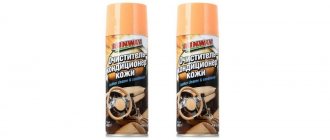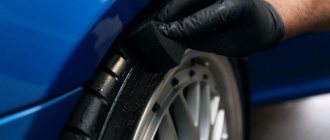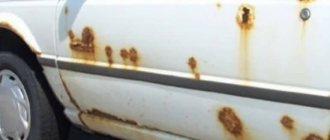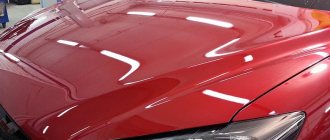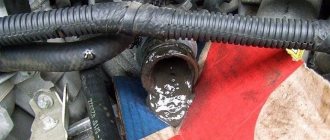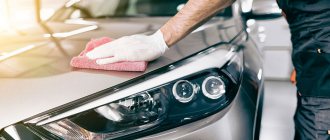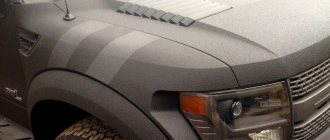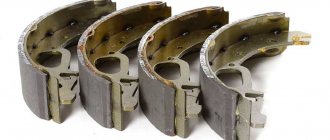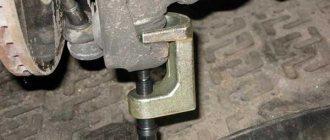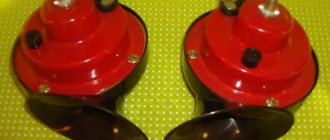| Place | Name | Characteristics in the rating |
| Top 10 best car polishing pastes |
| 1 | 3M 80349NF | Best all-rounder |
| 2 | TURTLE WAX Metallic Car Wax + PTFE | The most worthy budget pasta |
| 3 | Willson WS-02036 | The best superfine polish |
| 4 | G12310 Plast-X Meguiars | Restoring the transparency of plastic headlights |
| 5 | SONAX ProfiLine Headlight Polish | The best product for headlights |
| 6 | Doctor Wax Polyflon | Easy to use, long lasting paste |
| 7 | Koch Chemie F6.01 | Complete removal of scratches |
| 8 | Farecla G3 | Enhances paint shine |
| 9 | AREXONS Abrasive Paste | Removes oxides, stains, serious scratches |
| 10 | Menzerna 400 Heavy Cut Compound | Universal quick-acting remedy |
No matter how carefully the driver handles his car, scratches appear on the paintwork over time. The environment does not spare cars, leaving them with scuffs and peeling places. However, there is a way to restore your car to its original shine. Polish in the form of pastes is used to restore the appearance of the surface of the body and headlights. These drugs are suitable both for advanced cases and for prevention. They fill microdamages in the paint layer and protect it from aggressive substances. As a result, the car is not afraid of corrosion.
There are dozens of pastes on the market with fine, medium and coarse grains. They differ in the type of defects they deal with. For example, fine grains are sufficient for minor scratches, while powerful abrasive pastes remove large abrasions. Some modern products contain wax, which adds shine to the surface. We have collected the 10 best polishes of different types of action for headlights and car body, based on reviews from drivers.
Varieties by composition
A careful study of polishes will help you choose a product that is suitable for the task. The composition of the active ingredients is of decisive importance.
Abrasives
These additives are used to level and polish surfaces and remove scratches.
Paste with abrasive components must be used carefully, even with relatively slow manual operations.
Moving the buffing wheel quickly can damage the paint layer. Some technologies involve sequential treatment with agents with different abrasive properties.
Wax for shine
Such car polishes are used to create a shiny surface with a water-repellent layer.
The coating prevents contact of moisture (air) with the metal and blocks destructive corrosion processes.
A characteristic advantage is low cost. The main disadvantage is the removal of the product after 1 cycle of standard washing.
Synthetic polishes
This group offers a wide range of products with different types of active ingredients. Silicone is an analogue of wax. This substance is applied without much difficulty. However, the created layer can be easily removed by washing.
Polymer additives are suitable for creating a topcoat that protects against UV radiation and prevents paint color from fading.
Synthetic restorative compounds are used if it is necessary to repair deep (multiple) scratches.
More about liquid glass
The use of liquid glass as a car polishing component began relatively recently. Japanese experts were the first to propose adding special additives to the silicate components of potassium and sodium in order to polish cars with this composition to a shine. Liquid glass does not require any special conditions during application. The only caveat in this process is that you cannot immediately cover large areas of the body due to its rapid “setting”.
Treatment of the body with liquid glass is carried out in two stages:
- composition distribution over the surface;
- direct polishing (after drying).
If the concentration of liquid glass in the polishing substances is high, then the first stage is omitted and polishing begins immediately.
Need for polishing
Treatment, polishing, and application of protective compounds on the surface of the car is necessary to reduce the vulnerability of the body and interior to negative factors. Upon careful inspection of the metal, you may find tarnishing of the paint, minor defects and chips in the paint layer.
A high-quality car polish contributes to:
- anti-corrosion resistance of metal;
- formation of a protective layer on surfaces;
- the appearance of a glossy shine;
- partial restoration of the coating;
- reducing electrostatic charge that attracts fine dust and dirt;
- maintaining an attractive appearance of the vehicle.
Car polishes are periodically used for the prevention and protection of paintwork, as well as after painting, restoration, and body repair.
Leaders in testing results
During the tests, experts tested household polishing products using the following control parameters:
- ease of application;
- ease of creating a protective layer;
- shine and uniformity of coating;
- hydrophobic characteristics.
The test results are presented in the summary table:
| Place | Name | Price range, rub. | Peculiarities |
| 1 | Synthetic Wax Protectant | 405-440 | Thick consistency. Does not dry quickly, so it is suitable for treating large surfaces. The effect of “refreshing” the paint is clearly visible on dark surfaces. |
| 2 | Liqui Moly | 290-350 | Nice smell. Dries slowly. After rubbing, an even glossy coating is formed. |
| 3 | Meguiar's | 1150-1380 | Refreshes the appearance of paintwork. It rubs without much effort. Included in delivery: microfiber towel and foam sponge |
| 4 | Sonax 211200 | 4410-4600 | A product with a high concentration of wax. Polishing is done quickly, efficiently and without streaks |
| 5 | Turtle Wax Plus PTFE | 280-320 | The composition dries quickly. Processing is performed in fragments. The created gloss is better visible when applied to a dark coating |
Assessing the condition of the varnish, sanding the surface. Removing rough scratches
- For this we need:
- Abrasive sheets Unigrit finishing papers. This is sandpaper with a gradation from 1500 to 3000 grit. The peculiarity of its use is that before use it must be soaked in soapy water for at least 15 minutes.
- Holder for sanding paper for example Hi-tech backing pad E7200. Used in conjunction with Unigrit finishing papers. Ensures uniform load distribution on the sanded surface.
Attention! Always make progressive movements with sandpaper in one direction (at least in perpendicular directions). Never make circular or random movements.
Comparison table
| Product Name | The basis | Volume | Country of Origin |
| TURTLE WAX Metallic Car Wax + PTFE | Wax | 300, 500 ml | Spain |
| Runway Silan Guard | Polysilanes | 100 + 50 ml | Great Britain |
| SONAX XTREME Diamond Wax No. 1 | Wax + NetProtection formula | 250 ml | Germany |
| GraSS Express Polish | Carnauba wax | 500 ml | Russia |
| Doctor Wax Polyflon | Polyphlon | 300 ml | USA |
| RUSEFF Black Glossy | Natural Brazilian Carnauba wax, isoparaffin | 250 ml | Russia |
| Lavr Superfast Car Polish | Silicone + wax | 480 ml, 1 l | Russia |
| Soft99 Fusso Coat 12 Months | Teflon | 200 g | Japan |
| Koch Chemie Shine Speed Polish | – | 0.5 l | Germany |
| Bullsone Scratch Remover + Finish Polish | – | 0.2 kg (1 tube 100 g) | South Korea |
How to choose a polish for a car body?
Before purchasing a car body polish, you should consider the following factors:
- Consistency of the product - thick, solid polish needs to be applied with special brushes or sponges, with liquid ones it is much easier.
- Aerosol formulations are simple and easy to work with, but the consumption is very high.
- Formulas based on synthetic components create a protective film on the body.
- Body polishes are usually not used for treating plastic surfaces - you need to carefully read the manufacturer's instructions. Foam-like products can be used to treat plastic elements.
- The kit includes a sponge or cloth for application. There are manufacturers who complete polishes with their own napkins.
- Moisture- and dirt-repellent properties must be declared.
- Abrasive polishes are used to remove scratches and do not require pre-treatment of the surface; finishing polishes are applied only to the prepared coating, without scratches or damage.
- There are products for new cars that cannot be applied to old paintwork, and there are universal polishes that are suitable for cars of any age.
Complete car care can be provided at home; you don’t have to go to a service station or car wash and pay hefty sums. Moreover, modern manufacturers offer universal means for manual polishing that do not require much time and effort. Car body polish gives the coating a deep shine and reliably protects against the influence of ultraviolet radiation, chemical reagents, bitumen, salt, and minor mechanical damage. This rating with pros, cons and customer reviews will help you choose the most suitable product.
Forms
In the assortment of automobile stores there are polishes made in the following forms:
- The most common are liquid products. Such polishes are extremely uneconomical. It is recommended to purchase liquid polish with a high silicone content.
- Hard polishes are popular among car enthusiasts because they allow you to apply a thick layer of the substance. This property gives a more vibrant color and high shine after use. But it is important to know how to apply such polishing agents correctly.
- Polymer polishes in the form of a cream contain wax and silicone. They are distinguished by a good price-quality ratio, as well as ease of use for manual polishing.
- Aerosol car polishes are easy to use and apply. However, the effect of such drugs is often very low. By analogy with liquid polishes, it is recommended to purchase aerosols with a high silicone content.
Which paste is better to polish a car?
Choosing a winner for the best pastes was quite difficult because the differences between the best pastes are small. The winner of the rating, that is, ZviZZer Medium Cut One Step 3000, has a very high level of “aggressiveness” and high performance.
Works best with attachments and machines from the same manufacturer. This paste pleasantly surprised us not only with its high efficiency, but also, above all, with its price. Sonax Cutmax also deserves an award, but this is due to the use of low abrasive particle technology. The paste leaves no deposits or traces of processing.
Petr Alekseev
Regular author of articles for the magazine rating cars.
